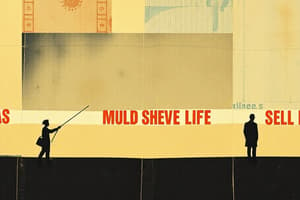Podcast
Questions and Answers
What is a galaxy primarily composed of?
What is a galaxy primarily composed of?
- Artificial satellites near Earth's moon
- Thousands of stars bound by gravitational attraction
- Millions of stars held together by gravity (correct)
- Planets revolving around a star
What defines a star cluster?
What defines a star cluster?
- Planets revolving around a star
- Artificial satellites near Earth's moon
- Millions of stars held together by gravity
- Thousands of stars bound by gravitational attraction (correct)
In what manner does a planet move around a star?
In what manner does a planet move around a star?
- In a straight line away from the star
- In a zigzag pattern towards the star
- In a circular path within the star
- In an elliptical orbit around the star (correct)
What does the term 'moonsletter' refer to?
What does the term 'moonsletter' refer to?
What type of question challenges learners to apply concepts within context?
What type of question challenges learners to apply concepts within context?
How do application-based MCQs enhance classroom learning experiences?
How do application-based MCQs enhance classroom learning experiences?
What is a notable advantage of Single Best Answer MCQs?
What is a notable advantage of Single Best Answer MCQs?
In True-False questions, what is a common disadvantage?
In True-False questions, what is a common disadvantage?
What is the key feature of Matching questions?
What is the key feature of Matching questions?
Which type of question may limit the depth of understanding due to its format?
Which type of question may limit the depth of understanding due to its format?
Why might Single Best Answer MCQs be criticized for promoting surface-level learning?
Why might Single Best Answer MCQs be criticized for promoting surface-level learning?
In what way do Matching questions differ from True-False questions?
In what way do Matching questions differ from True-False questions?
Flashcards are hidden until you start studying
Study Notes
Types of Multiple Choice Questions
Multiple Choice Questions (MCQs) serve as a versatile tool in testing a wide range of skills and concepts across various academic disciplines. As part of MCQ design, creators must carefully consider the type of question at hand, ensuring it aligns with the desired pedagogical goals. Here we explore some common forms of MCQs:
Single Best Answer
These MCQs feature a stem with a question, followed by several potential answers. Only one of these answers is considered correct, and the learner selects the best fit. Example: Which of the following materials has the highest specific heat capacity? A) Ice B) Air C) Mercury D) Rubber
Correct: C) Mercury
Advantages: Simple scoring, broad applicability, efficient for large class sizes.
Disadvantages: May encourage rote memorization rather than deeper understanding of material.
True False
True-False questions consist of a statement presented as true or false. Learners must decide whether the statement is accurate. Example: Is mercury liquid at room temperature? A) True B) False
Correct: B) False
Advantages: Quick and straightforward to respond to.
Disadvantages: Limited depth of questions.
Matching
Matching questions require learners to connect related elements. For example, definitions with corresponding terms. Example: Define the following astronomical concept:
A) Galaxy B) Star cluster C) Planet D) Moonsletters
And match them to their descriptions:
- A galaxy consists of millions of stars held together by gravity.
- A star cluster contains thousands of stars bound by gravitational attraction.
- A planet revolves around a star in an orbit.
- A moonsletter refers to artificial satellites placed near Earth's moon.
Match: A - 1, B - 2, C - 3, D – 4
Advantages: Encourages comprehension and recall.
Disadvantages: More complex structure may demand additional effort.
Application Based
Application-focused MCQs challenge learners to apply concepts within context instead of merely recognizing isolated pieces of information. Example: Given a chemical equation, predict the limiting reactant:
C_6H_12O_6 + C_2H_5OH → CH_3CHO + CO_2 + H_2O
Which substance has fewer moles after the reaction?
A) Glucose B) Ethanol
Correct: A) Glucose
Advantages: Promote critical thinking and synthesis of concepts.
Disadvantages: Require more advanced subject matter knowledge.
By tailoring question styles to particular objectives, educators employ MCQs effectively, enhancing classroom learning experiences and assessment designs.
Studying That Suits You
Use AI to generate personalized quizzes and flashcards to suit your learning preferences.



